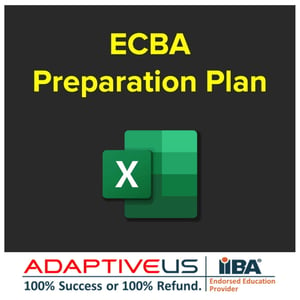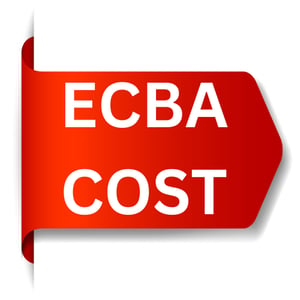ECBA Study Guide

- Comprehensive 270+ pages Certification Study Guide loaded with key terms, tips, techniques, crosswords and chapter review questions to help you prepare for the certification exam.
- The Study guide is created based on extensive research of the BABoK ® V3 Guide by experts and it captures all the essentials from the exam perspective.
- Presented in a very well-organized way, it’s a great resource to help you prepare for examinations with minimal effort.
- The concise, crisp study guide captures all essentials in one document removing all duplications and redundancies.
- Master the core knowledge areas, activities, tasks, deliverables, Stakeholders and their relationships.
- Identify and master the principles, activities, tasks, techniques, and tips described in the BABOK ® Guide v 3.0.

ECBA Questions

ECBA Preparation

ECBA Exam Tips

ECBA BABOK Work Cloud

ECBA Benefits

ECBA Cost
ECBA Study Guide: Your Key to Passing the ECBA Exam in 2025

Key Highlights
- Kickstart your Business Analysis career with the ECBA certification.
- Grasp the fundamentals of Business Analysis, aligned with the industry-recognized BABOK guide.
- Understand the ECBA eligibility criteria and exam format to confidently approach the certification.
- Utilize recommended study materials, including the BABOK guide, business analysis standard and practice exams, for effective preparation.
- Join IIBA Endorsed ECBA training for support throughout your ECBA journey.
Introduction
For individuals wanting to become business analysis professionals, starting a successful career often begins with the Entry Certificate in Business Analysis (ECBA™) exam. This certification is recognized worldwide. It shows that you have basic knowledge in business analysis, making you stand out as a skilled professional. This complete ECBA study guide is created to give you all the important information and resources you need to pass the ECBA exam. It will help you take that vital next step in your business analysis career.
Understanding ECBA Certification

The ECBA certification comes from the respected International Institute of Business Analysis (IIBA®). It shows that you understand basic business analysis ideas and practices. This certification proves your dedication to your career and your knowledge of key concepts from the Guide to the Business Analysis Body of Knowledge® (BABOK® Guide). It is especially helpful for people who are just starting out in this field or for those who want to make their current business analysis skills official.
What is ECBA?
ECBA means Entry Certificate in Business Analysis. It is a business analysis certification known around the world for beginner business analysts. The International Institute of Business Analysis (IIBA®) offers it. Having the ECBA certification shows that you understand basic business analysis ideas, techniques, and tasks from the BABOK® Guide, and is also essential for preparing for the certification exam.
Getting this certification shows you care about growing your skills and improves your trust as a business analyst. The ECBA exam looks at the key ideas of business analysis. It makes sure that those certified have the knowledge and skills needed to do well in entry-level business analysis jobs.
Importance of ECBA in Business Analysis Career
In today's job market, the ECBA certification gives a big boost to new and aspiring business analysts. It proves your knowledge and shows you are serious about growing in your career and following the best practices in the field.
Having the ECBA certification in certified business analysis can help you find new job opportunities, make more money, and move up in your career faster. Employers see this certification as a sign of quality and skill. It helps you stand out when applying for jobs and can help you move forward in your career. The ECBA also opens the door for more growth in business analysis. It helps you reach senior roles and earn specialized certifications.
Professional Experience Needed
The ECBA exam is meant for people who are just starting in business analysis. You do not need professional experience to take this exam. This is great for those new to business analysis, people changing careers, or anyone who wants to prove their knowledge in business analysis.
Still, having some real experience can help a lot. Working on projects or doing internships lets you connect what you learn in theory with how things work in the real world. This helps you understand business analysis better and apply its principles effectively.
Preparing for the ECBA Exam

Preparing well is essential for passing the ECBA exam. A good study plan and the right materials will help you gain the knowledge and confidence to succeed on exam day. The ECBA exam is tough and checks your understanding of business analysis principles. So, a focused and disciplined way of studying is very important. Start by getting to know the ECBA exam blueprint. This blueprint shows the key knowledge areas that will be covered in the exam.
Key Topics Covered in ECBA
The ECBA exam encompasses six knowledge areas, each focusing on a specific aspect of business analysis. These knowledge areas and their respective tasks are derived from the BABOK® Guide. Familiarity with these areas is essential for exam success.
| Domain | Definition | Explanation |
|---|---|---|
| Introduction | Understanding Business Analysis | Understanding value of business analysis |
| Introduction | Mindset for Effective Business Analysis | Describes the needed mindsets for effective business analysis |
| Introduction | Implementing Business Analysis | Describes how business analysis gets implemented across various industries and domains |
| Change | The act of transformation in response to a need | Organizations initiate change to remain competitive and improve performance. Business analysis supports the planning and execution of these changes. |
| Need | A problem or opportunity to be addressed | Needs can drive change by prompting stakeholder action. Conversely, changes can create new needs by altering the value provided by existing solutions. |
| Solution | A specific way of satisfying one or more needs in a context | A solution meets a need by either solving a problem or enabling stakeholders to seize an opportunity. It may consist of various components that deliver value, such as technology, manual processes, process improvements, business model changes, or enhanced organizational capabilities. |
| Value | The worth, importance, or usefulness of something to a stakeholder within a context | Value can be created by generating benefits or preserved by reducing risks and costs. It may be tangible—measurable and often linked to money—or intangible, like reputation or morale, which are harder to measure. Value can also be compared across options to determine which offers greater benefit to stakeholders. |
| Stakeholder | A group or individual with a relationship to the change, the need, or the solution | Stakeholders, both internal and external, are identified by their interest in, impact on, and influence over a change. They are categorized based on their connection to the needs, changes, and solutions involved. |
| Context | The circumstances that influence, are influenced by, and provide an understanding of the change | Context refers to all environmental factors that influence a change. These may include cultural, social, economic, technological, and organizational elements such as attitudes, behaviors, market trends, regulations, and infrastructure. |
Knowledge Areas Covered
| Knowledge Area | Description |
|---|---|
| Business Analysis Planning and monitoring | Understanding how to plan, manage, and track business analysis activities throughout a project lifecycle. |
| Elicitation and Collaboration | Mastering the techniques for gathering requirements and effectively communicating with stakeholders. |
| Requirements Life Cycle Management | Learning how to analyze, document, manage, and maintain requirements from inception to retirement. |
| Strategy Analysis | Understanding business goals and objectives, analyzing current state, and recommending solutions. |
| Requirements Analysis and Design Definition | Detailing and refining requirements and designing solutions that meet stakeholder needs. |
| Solution Evaluation | Assessing the performance and value of solutions and recommending improvements. |
Recommended Study Materials
Choosing the right study materials is very important for doing well on the ECBA exam. The main resource you should use is the BABOK® Guide. It gives a complete framework for business analysis. You might also want to add the official ECBA™ Certification Study Guide to help you understand better.
Using practice exams is a good way to check your knowledge and find areas you need to work on. Also, look for free resources, like the Kindle app on your smartphone, to read business analysis books and study anytime. Joining online study groups and forums can give you helpful insights and support.
Conclusion
Passing the ECBA exam can lead to great chances in business analysis. It is important to understand key topics and use suggested study materials to do well. You need to meet the educational requirements and gain work experience to prepare for the exam. Investing time and energy in your ECBA certification path means investing in a successful career in business analysis. Stay focused on the important points and do your best to pass the exam with confidence. Good luck on your ECBA certification journey!
Frequently Asked Questions
What is the format of the ECBA exam?
The ECBA exam is a multiple-choice test that has 50 questions. You will have 1 hour to finish it. The exam is taken online and is supervised from a distance. It checks your knowledge of business analysis principles and how to use them in real life. It is a good idea to take practice exams. They can help you get used to the format and the kinds of questions you will see on exam day.
What are the key topics covered in an ECBA study guide?
Key topics in an ECBA study guide include business analysis planning and monitoring, elicitation and collaboration, requirements life cycle management, strategy analysis, and solution evaluation. This guide aspiring ECBA candidates through the core competencies required for success in the ECBA exam.
.webp?width=350&height=54&name=2026%20Jan%20Adaptive%20Logo%20(1).webp)
